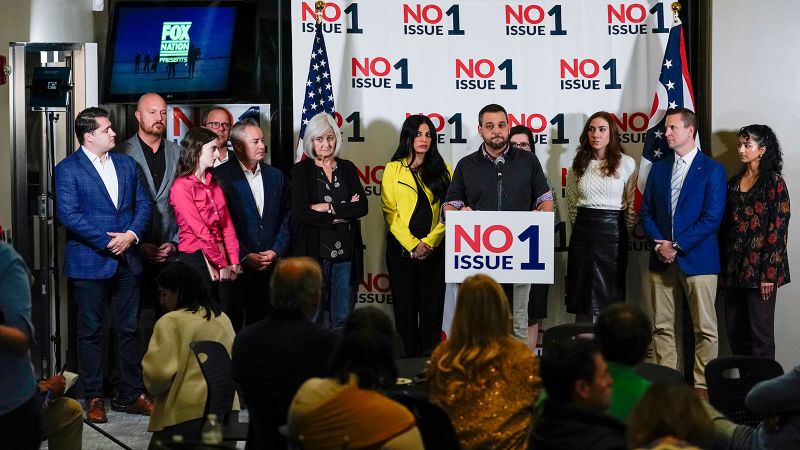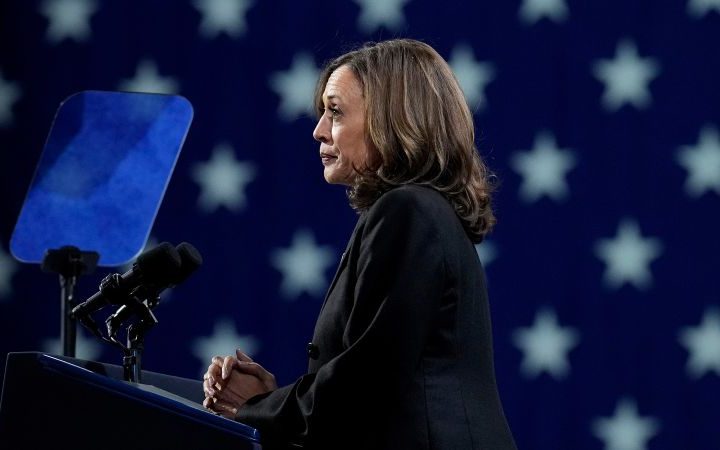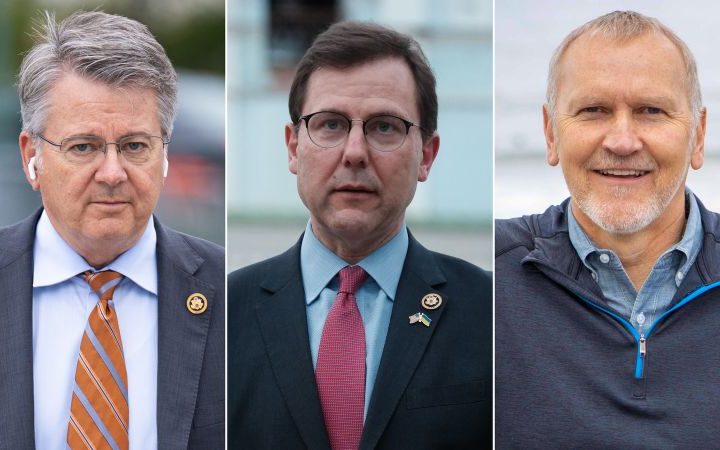A leading anti-abortion group is pushing back a day after Gov. Ron DeSantis accused the movement of getting caught “flat-footed” in the latest electoral fight over access to the procedure.
Responding to the Florida governor’s remarks at Wednesday’s presidential debate, Kelsey Pritchard, director of state public affairs for Susan B. Anthony Pro-Life America, told CNN that DeSantis “may not be aware of how hard the pro-life community fought in Ohio,” where voters on Tuesday approved a ballot initiative to enshrine abortion access into the state constitution.
Activists in Ohio, Pritchard said in a statement, “spent countless hours pouring everything they had” into attempting to defeat the measure and were outspent 2-to-1. She went on to issue a warning to the Florida Republican.
“With Florida expecting a ballot measure fight in 2024, Gov. DeSantis will need to raise the funds and lead the fight to defend the heartbeat protection he signed into law,” she said.
DeSantis’ campaign did not respond to a request for comment.
The fight over abortion in America gained new urgency for GOP presidential contenders at the third primary debate, which took place a day after Republicans suffered defeats in key races where abortion loomed large, including the Kentucky governor’s race and the fight for control of the Virginia legislature.
Asked to identify “the path forward for Republicans on this issue,” DeSantis pointed a finger at the anti-abortion movement.
“You got to do a better job on these referenda,” he said. “All this stuff that’s happened to the pro-life cause – they have been caught flat-footed on these referenda, and they have been losing the referenda.”
He doubled down after the debate, telling NBC News that the “pro-life movement has got to start keying in on these referenda.”
“They have been getting their clock cleaned,” he said.
Since the reversal of Roe v. Wade last year, voters in a cross section of states have moved to affirm the right to an abortion through ballot measures. Last year, voters in Michigan, Vermont and California added abortion protections to their state constitutions, while Kansas, Kentucky and Montana voters rejected efforts to roll back access.
Amber Roseboom, vice president of operations for Right to Life of Michigan, said that abortion rights advocates were ready for a fight “the moment that Roe v. Wade was overturned” but that their enthusiasm had not been matched by the donors that reliably fund GOP candidates. In Michigan, for example, abortion rights groups spent more than $40 million last year urging voters to support a ballot initiative to codify abortion access, while anti-abortion groups had about half as much for their persuasion campaign.
“Since the election, there’s an unfortunate and uniformed narrative which is blaming the pro-life movement for recent losses,” Roseboom said. “I can appreciate Gov. DeSantis’ perspective. But I don’t agree with the inference. As far as a failure, it’s from donors on the right who have for whatever reason determined it’s not worth investing in the fight at this point.”
Danielle Underwood, a spokeswoman for Kansans for Life, said the anti-abortion movement is up against an opposition that she said was “funded by coastal elites” since the Supreme Court’s Dobbs decision erased federal abortion protections.
DeSantis had previously defended anti-abortion activists against accusations – primarily from former President Donald Trump – that they were at fault for GOP losses in 2022. He cited his own 19-point reelection victory in Florida after signing a 15-week abortion ban into law. He has since signed a new law that cuts off abortion access at six weeks with limited exemptions in cases of rape, incest or if the mother’s life is at risk. (That law is currently on hold as the state Supreme Court decides a challenge to the 15-week ban.)
“I reject this idea that pro-lifers are to blame for midterm defeats,” he said at the second GOP debate.
This isn’t the first time, though, that DeSantis has clashed with Susan B. Anthony Pro-Life America as a presidential candidate. The organization’s president, Marjorie Dannenfelser, questioned DeSantis’ leadership after he declined to back a federal abortion ban earlier this year.
“A pro-life president has a duty to protect the lives of all Americans,” she said. “He should be the national defender of life.”
DeSantis has since said he would sign a 15-week abortion ban as president if it reached his desk, though he did not reaffirm that commitment at Wednesday’s debate, saying states may take different approaches depending on their political makeup.
“You’ve got to work from the bottom up,” he said.
The Ohio ballot initiative, called Issue 1, will prevent the state from restricting abortion access before fetal viability, which doctors believe is around 22 to 24 weeks of pregnancy.
Ohio’s anti-abortion movement made a concerted effort to block Issue 1. Republicans, including Gov. Mike DeWine, Sen. J.D. Vance and Secretary of State and 2024 Senate candidate Frank LaRose, actively campaigned against the measure. DeWine appeared in a direct-to-camera ad with his wife, Fran, urging voters to reject the initiative, which they called confusing and too extreme.
In August, Ohio voters rejected an initiative advanced by the state’s Republican-led legislature that would have raised the threshold for passing ballot measures to amend the state constitution from a simple majority to a 60% vote, a move seen as an effort to make the November abortion rights amendment harder to approve.
SBA Pro-Life America poured more than $15 million into the state to help pass the August measure and block the November vote, its biggest contribution to an abortion-related ballot initiative since Roe was overturned. Protect Women Ohio, the coalition urging a “no” vote on Issue 1, raised more than $9.9 million for the November election.
Still, abortion rights advocates in Ohio outraised and outspent anti-abortion groups thanks to major contributions from national partners, continuing a trend seen last year. Ohioans United for Reproductive Rights, the coalition backing Issue 1, raised more than $28.7 million, a mix of small-dollar donors, large donations from liberal groups, coalition partners like the ACLU and wealthy donors like Illinois Gov. J.B. Pritzker.
Abortion rights advocates are working to get initiatives on the 2024 ballot in more states, including Arizona, Colorado, Nevada, Florida, South Dakota and Nebraska.
In DeSantis’ home state, the Florida Division of Elections has already validated 490,000 signatures submitted by the coalition backing an abortion rights initiative, more than half of the total necessary to get on the ballot in 2024. Constitutional amendments need 60% of the vote to pass in Florida, but advocates say they feel buoyed by the success in Ohio.
“I think there are other hurdles, but the momentum is absolutely on our side,” said Laura Goodhue, the executive director of the Florida Alliance of Planned Parenthood Affiliates. “The citizens of Florida do not want the government interfering in their decisions about their health care, and if and when to become a parent.”
Floridians Protecting Freedom, the coalition gathering signatures for the initiative, raised more than $8.9 million between April and the end of September, according to a recent campaign finance report. Goodhue said the coalition has raised about $12 million to date.
Read the full article here







